Beyond the Ring: Triumphs of Pacific Boxers at the 2024 Olympics
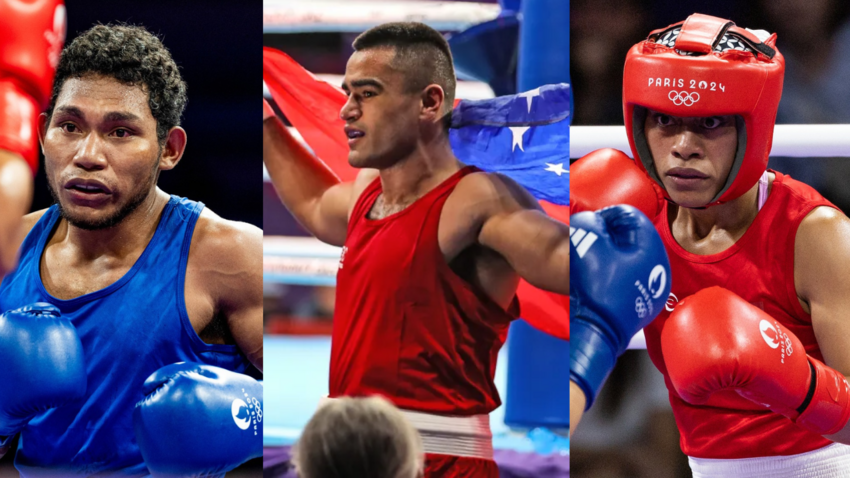
Down, But Not Out.
In the opening weekend of the 2024 Summer Olympics, three very different boxers took to the ring, each with extraordinary pressures on them. Though none would be victorious in their match, it was in many ways what happened off the ring that made them simply competing vitally important to both their nations and the wider Pacific community.
Fe’ofa’aki Epenisa is the first female boxer to compete for Tonga at the Olympics, which you may have already heard about. What you might not know is that boxing was banned in Tonga less than a decade ago.
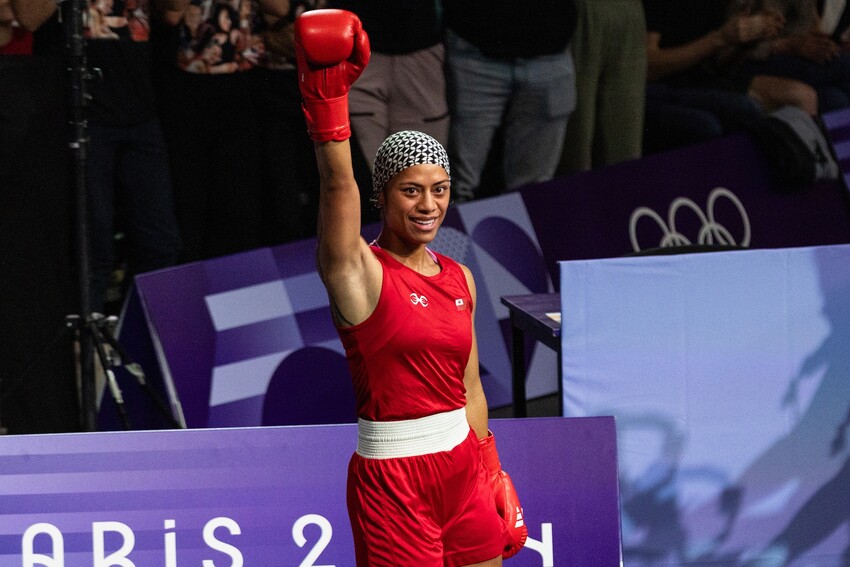
In 2018 a letter was sent from then Education Minister Penisimani Fifira to Tonga High School issuing a ban on rugby and boxing. The ban made international headlines, with rugby the focus, partly because Jonah Lomu remains the most famous pacific rugby player of all time. The boxing ban was a bit of an add on to most stories, but it was a big deal for female boxers because the ban was not about safety. Instead, women were told it went agains the culture. A very public international sporting community and Tongan diaspora backlash lead to a reversal of the policy, but women’s rugby and boxing had taken a haymaker.
Six years later, though, Epenisa, though beaten, is unbowed.
“Knowing that we made that much progression in such a short amount of time. It’s so encouraging”
As she stands in front of journalists, smiling at her first Olympics post-bout press mixer, the Tongan Chef de Mission, Viola Ulakai, is waving a giant flag at the edge of the press area yelling “Go Tonga! Go!”
Epenisa acknowledges the spectacle with a slight chuckle, but no embarrassment. For it is written somewhere that where Tongan’s play sport, there will always be a loud fan with a giant flag.
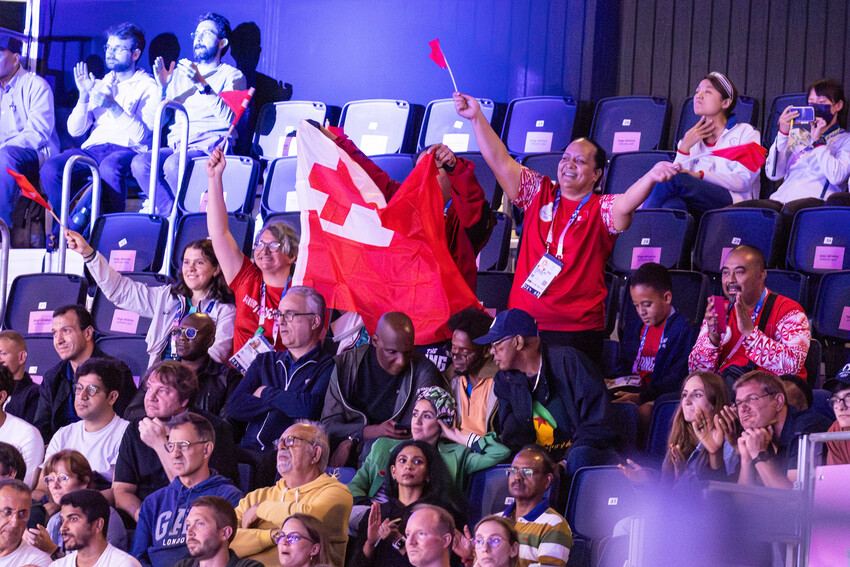
“I don’t have to be the first woman to win a medal for Tonga” she continues. “I mean I would love to, but hopefully it inspires somebody… because I’m not just the only woman here today, I’m the only boxer.”
It became an emotional presser as the impact of what she had achieved by becoming an Olympian hit her, maybe even harder than her opponent had. She cried a little as she explained
“I really did come from nothing, you know. And it wasn’t easy. If it was easy, there would be a lot more girls in my position. It was a difficult process. But knowing that I’ve been able to put my feet in the door is so encouraging. Next thing you know, my whole leg. And my leg is big. It’s gonna bust that door open and we’re all gonna sprint in."
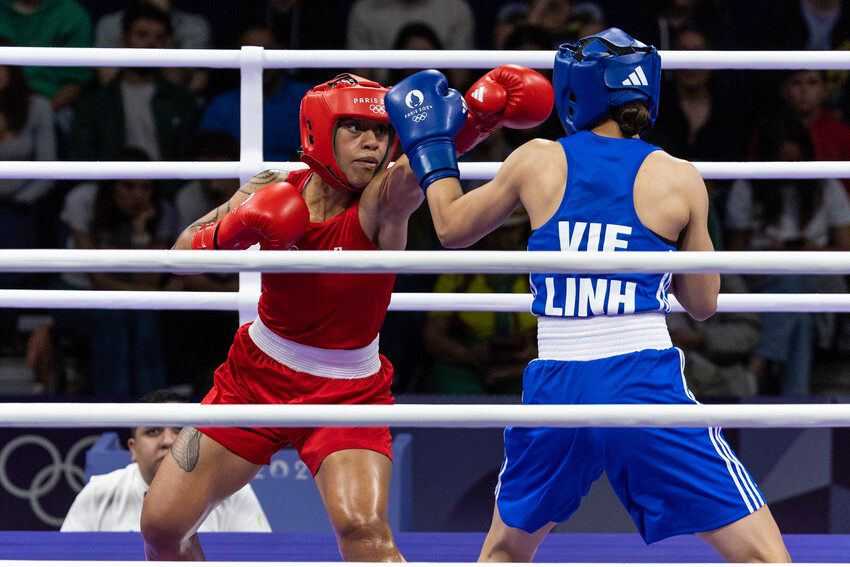
Fe’fak’aki was one of just four athletes representing her country and had the honour of being a flag bearer at the opening ceremony. It was a moment she was able to share with her family, not just through the international broadcast, but through her presentation.
“My older brother, my older sisters, are in Australia picking fruit. My other Sister is in Tonga… my outfit in the opening ceremony, they gathered that all for me, and made sure that I looked beautiful. And you know when I put that oil on my body I felt their love.”
Epenisa lost to Vietnam’s Hà Thị Linh unanimously, but refuses to be discouraged by it. She showed up, fought to the end, and knows they’ll be other fights to win, so has a message for the Women of Tonga;
“Keep going ladies. I know sometimes we get held back by our families. I just want to let you know you’re doing more for them, if you put your goals first. Because when you make it, then you reach back and grab the next person behind you. Get them right next to you, and that’s what I’m trying to do ”
Viola Ulakai agrees.
“We all know that time, we can’t hold it back, you know, because there comes a change. In our culture even though for us from the region, and especially in Tonga, watching your daughter… it wasn’t there before, but we can’t help it. What we need to do is support them in what they do best.”
John Ume knows about what support can help accomplish.
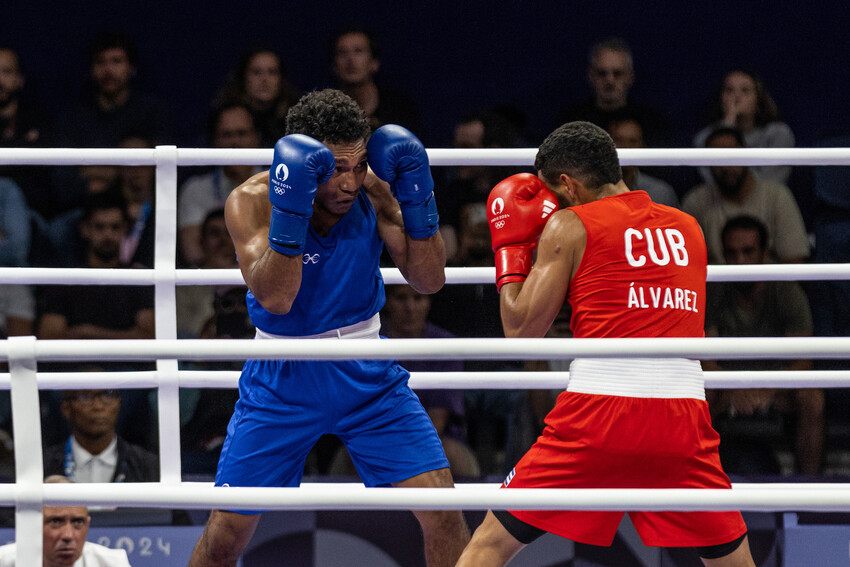
The 27 year old Papua New Guinea boxer initially hadn’t qualified for the Paris Olympics, and was resting on his couch in Port Moresby when the phone rang and an incredible opportunity presented itself. An athlete from the Solomon Islands could no longer box, and Ume had been named his replacement.. if he wanted it.
“To be honest I wasn’t prepared.”
There were a couple of problems that made the whole journey surreal. The date was July 20th, one week before the opening ceremony, and eight days before the fight against Cuban Boxer Erislandy Álvarez. Cuban’s are a bit like the All Blacks of boxing, and never to be taken lightly. The flight alone would eat up at least a day, possibly two. His coach, Australian Peter Morrison, was in Sydney, frantically trying to get leave off work to join him. And since neither of them was expecting to have a fight there was a very serious issue of Ume’s weight.
“I was called last minute. I was at home, they called me, they said ‘Oh, you have to get ready, I was ready for one week. So I just got here. They called me up, I was overweight. I had to make my weight within the last minute. Just this morning I made my weight. ”
In what can actually be described an Olympian effort, Ume shed 7kilos in one week. He’s been to the Olympics before, so wasn’t shell shocked by everything, but with so little time to train, and facing a highly skilled opponent, the cards were never going to be on his side.
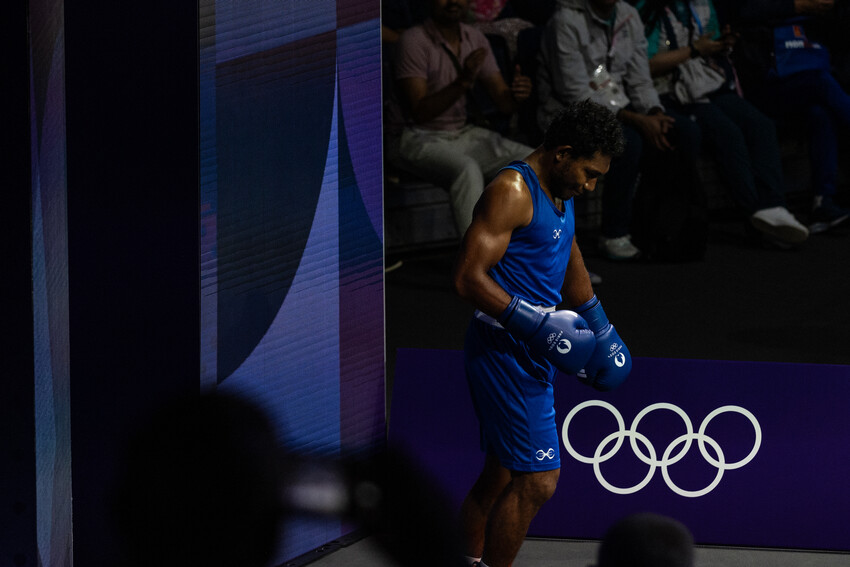
Half way through the second round, the referee stopped the fight. Ume had landed some decent shots, but taken more than a few hard ones. Yet though it all he did it with a smile on his face.
“I was ready for it mentally, but physically no.. I was smiling because I knew I wasn’t prepared for it. But if I did, physically, it would be a different story.”
His Coach agreed with John’s self assessment and adds
“He got a call - ‘Do you wanna go to the Olympics?’ - I mean what would you do? He took it with both hands and was an utmost professional, from that point until now."
This was Ume’s last Olympic fight, and even though it wasn’t under optimal conditions, he’s savouring the opportunity and hopeful for the future.
“I’m still proud.. I didn’t make it, to be honest, but next time maybe a PNG boxer will come, he’ll do better than me, he’ll go miles, even get a medal”
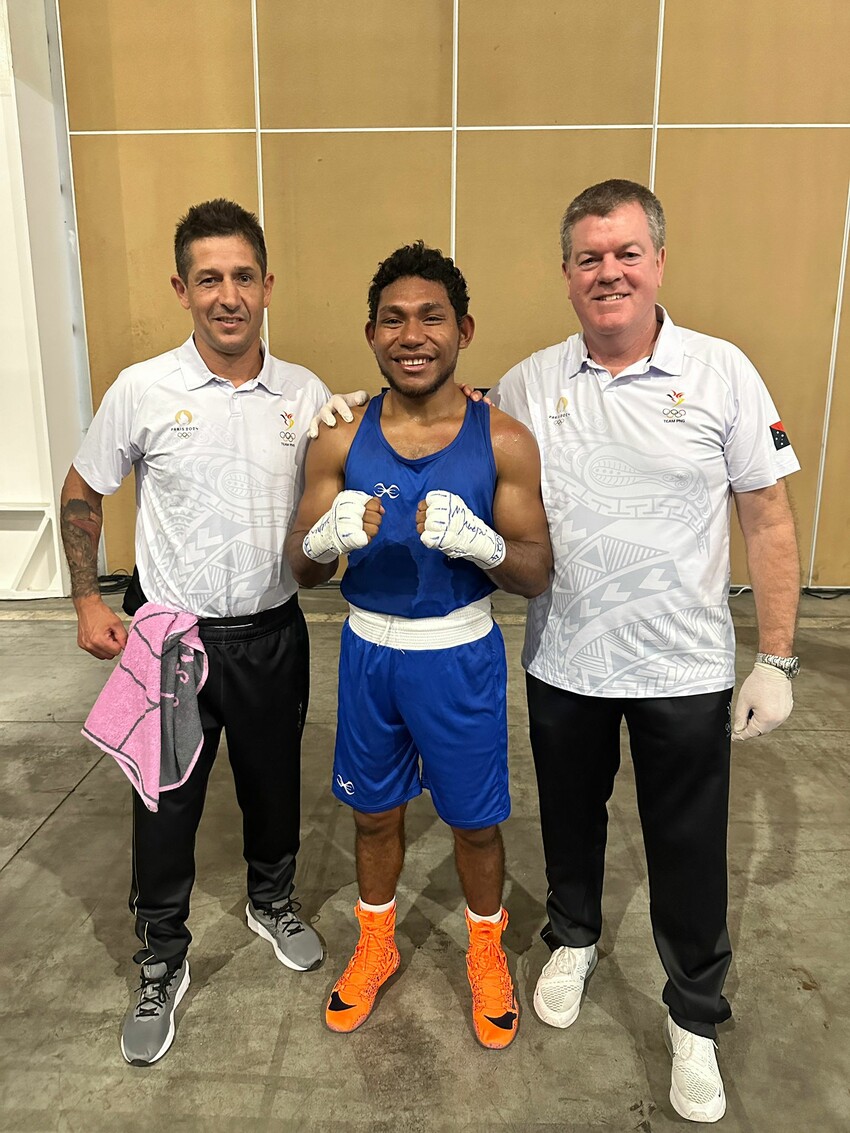
And throughout the press mixer, that smile never leaves his face, because when he finally get’s back to his couch, he’ll know that though he lost the fight and barely had time to get his feet, he accomplished something extraordinary. His final message for his fans back home?
“Don’t give up. Don’t give up on your dreams. Dreams do come true. If you fail one time, go again. Don’t stop. You miss some, you get some.”
Coach Morrison watches John walk off proudly. He finds his own smile while talking to the press afterwards, and there’s a pride as explains:
“Look he’s a bit of an inspiration I think to kids all over PNG. He doesn’t drink, he doesn’t smoke, he doesn’t chew betel nut. He’s just this kid that goes to training and inspires other people from his community. He’s now a dual Olympian. You know you can’t be what you can’t see… Let’s hope it inspires someone else from PNG or the other islands in the Pacific.”
Unfortunately that wouldn’t be the end of Peter Morrisons boxing duties that weekend. On Friday the 26th of July, hours before the opening ceremony, it was announced that the Samoan boxing coach, Lionel Elika Fatupaito, had died suddenly in the Olympic Village. He was 60.
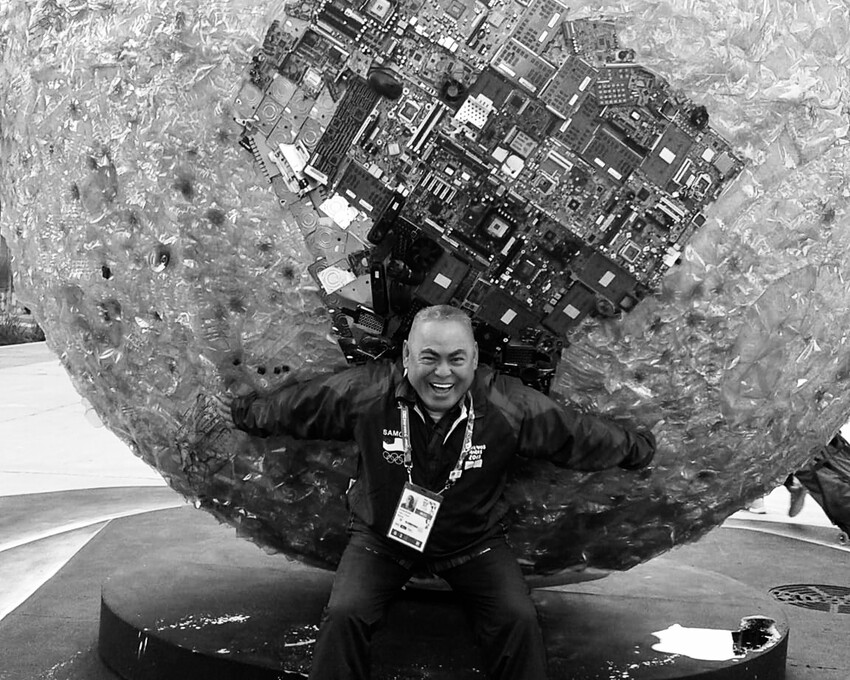
Morrison was asked to help the Samoan team prepare their sole boxer, heavyweight Ato Plodziicki-Faoagali for his first Olympic fight, happening just a couple of days after his Coach’s death.
“My coach passed away and I’m fighting with a very heavy heart.” Ato would reflect afterwards. “I miss him and I love him.”
With a couple of Samoan flags in the crowd, and some loud “Chahoos!” echoing round the arena, Plodziicki-Foagali stepped in to the ring to face Belgian Victor Schelstraete, who had secured Bronze at the 2021 World Championships.
Samoa’s sole boxing hope holds his own for three hard hitting, floor tumbling, crowd roaring rounds, but it isn’t enough. The victory goes to the Belgian. On the one hand, Ato had hoped to get a win for his coaches memory, but at least now he’ll be able to properly grieve.
The 25 year old could have pulled out. Everyone would have understood. In fact there were quite a few who were surprised he decided to fight.
“I thought about it [not fighting] the whole way here. It’s been hard”
After around half an hour of medical care following the bout, Ato is talking to the few journalists gathered when the damn finally breaks and the tears begin to fall.
“I’ve been struggling these past few days. I thought I was gonna win a medal for sure, but it’s been really hard mentally on me. I don’t care about the medal right now, I just.. my deepest feelings right now are for coach Lionel right now. I’ve been holding it in”
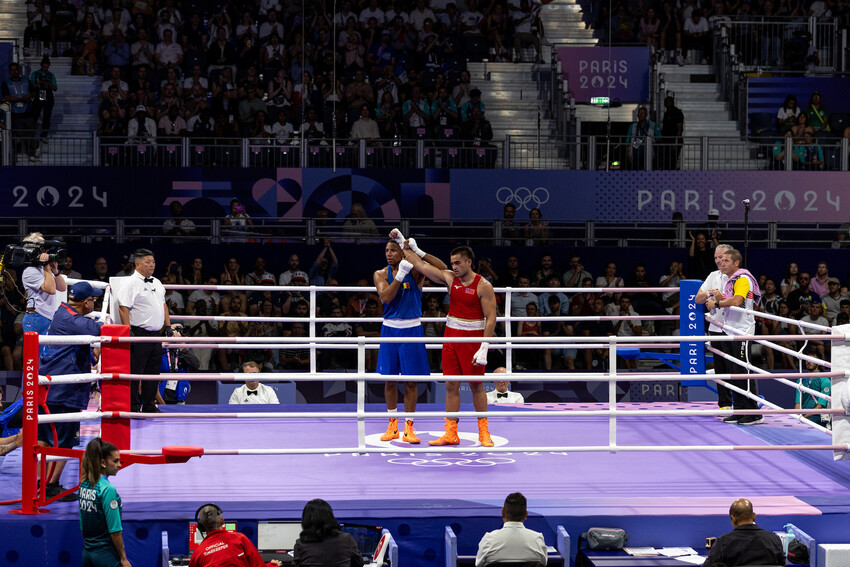
Plodziicki-Foagali is an accomplished amateur, having picked up gold at the 2023 Pacific Games. He believed he could medal, and he wasn’t the only one. Were he mentally prepared, there’s a chance the contest would have been much tighter. Then again there are fights, and then there are fights.
After claiming the win, Victor Schelstraete thanks his coaches, thanks the Samoan team, and then does something unexpected; he leads Ato to the middle of the ring and raises his arm so the crowd can stand and cheer him. He explained after:
“I told him you’re a winner for sticking through, and you deserve nothing but respect for sticking through and honouring your coach, and that’s why I raised his hand and told him you’re a winner as well.”
Because of the vast sums of money involved in professional boxing, it can be easy to forget that amateur boxing is, by comparison, a passion project. That lack of financial resources means the bond between a coach and an olympic athlete can be as close, and sometimes closer, than family.
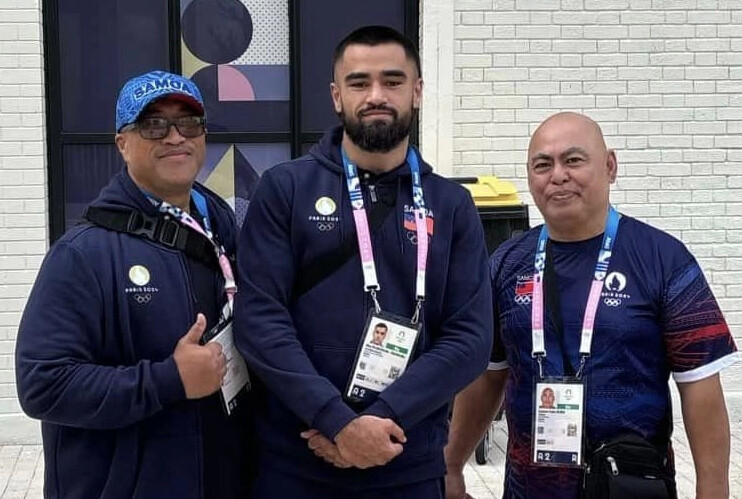
“He honoured his coach by fighting and you know these coaches, they’re very selfless. They put on all their work for us to get here, and for him not to experience that moment, its very sad.”
It was a simple gesture, raising an opponent’s hand, but it might also go down as one of the more compassionate moments at these Summer Games. That may seem strange to those unfamiliar with Boxing till you realise perhaps no one in the building understood what Plodziicki-Foagali went through mentally in his fight better than his Belgian opponent.
“I gave him a sincere, heartfelt, heartwarming, respect and appreciation that he pulled through, he came through. Because I asked myself the question ‘would I have been able to box if my coach had died’ and I genuinely don’t think so. So big respect to him, he’s got a big heart.”
And though he lost his fight, his coach, and his opportunity for Olympic glory, Ato Plodziicki-Foagali has not lost hope.
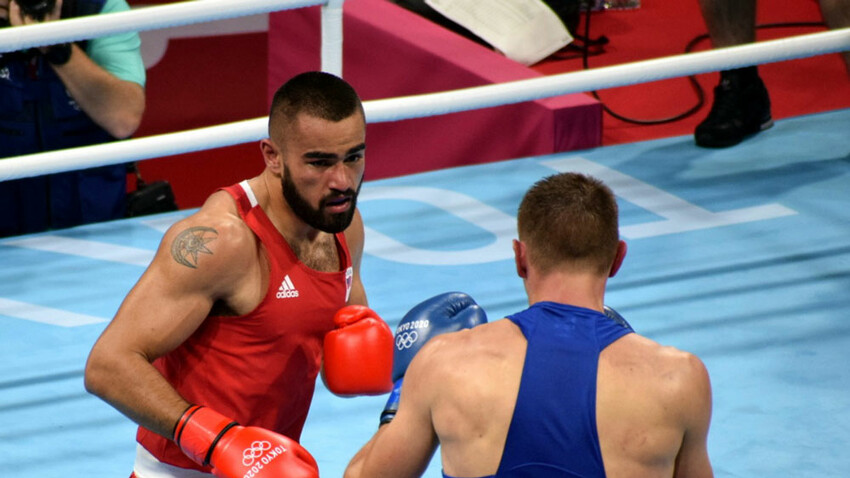
“Everyone’s been so supportive of me and sending me messages, even through these hard times. I appreciate everyone. I’m gonna come back stronger and chase my dreams still.”
Context is important. On a score card, a person might look at the results of Paris 2024’s opening weekend and conclude the pacific boxers simply lost, were in fact losers.
But through their journeys to their fights, and by stepping into the ring, Tonga’s first female olympic boxer, Papua New Gunea’s unexpected double-olympian, and Samoa’s grieving heavyweight showed that there is glory to be found in resilience and perseverance; an example that people across the Pacific can be proud of.
-
Written by Jame Nokise
